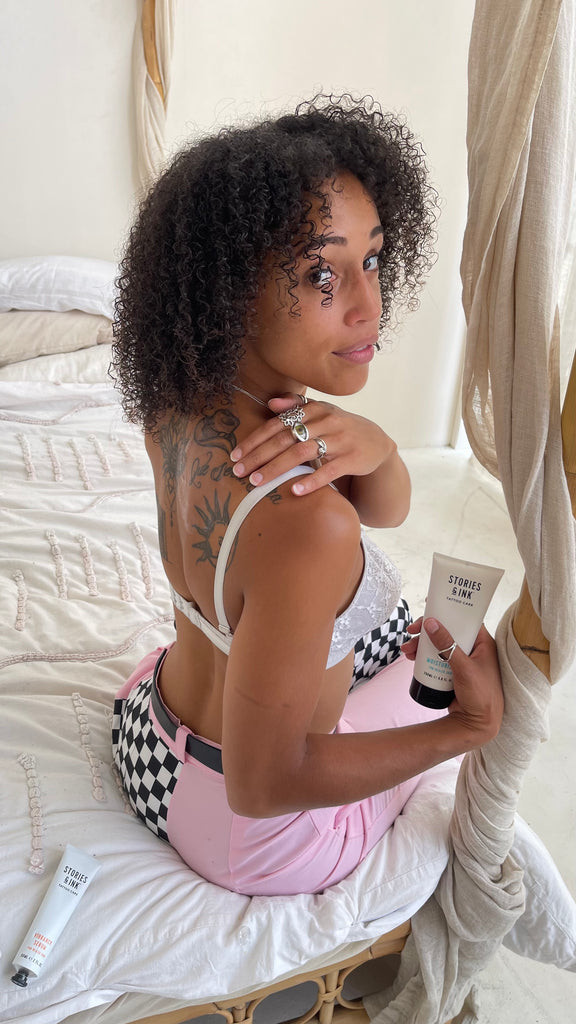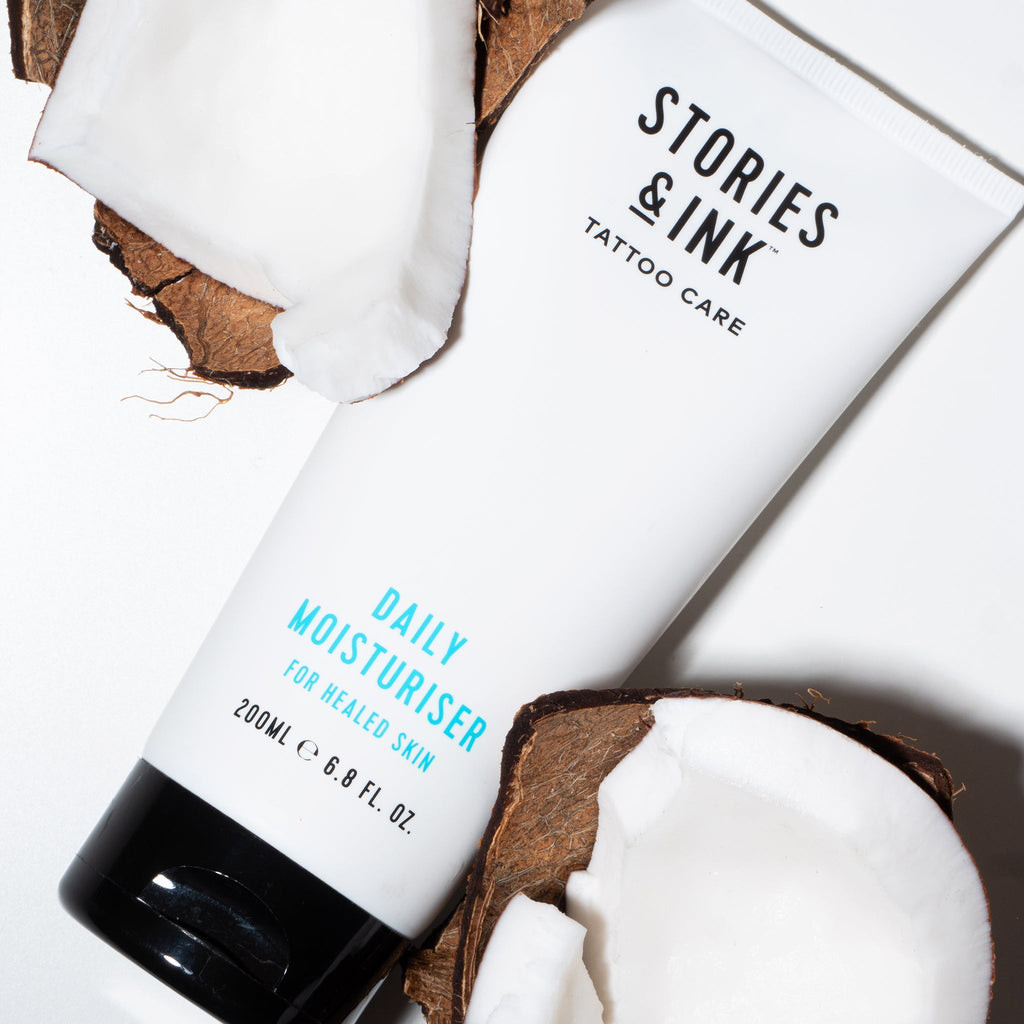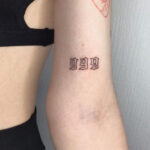Can you scratch a tattoo? No, you absolutely should not scratch a new or old tattoo, as scratching can significantly disrupt the healing process and potentially damage the artwork. At tattooat.com, we understand how frustrating tattoo itch can be, so we offer expert guidance and premium aftercare solutions to help you soothe the itch without compromising your tattoo’s integrity. For vibrant, healthy tattoos, proper aftercare and itch management are essential, reducing the risk of infection and preserving the quality of your body art.
1. What Causes Tattoo Itching?
Tattoo itching is a common and often irritating part of the healing process, but understanding why it happens can help you manage it effectively. Several factors contribute to this itchiness:
- Healing Process: As the skin repairs itself after getting a tattoo, it goes through stages like scabbing and peeling, which naturally cause itching. According to dermatologists at the American Academy of Dermatology, this is a sign that your skin is regenerating.
- Immune Response: The body recognizes tattoo ink as a foreign substance. Your immune system releases histamines, which can lead to inflammation and itching.
- Dryness: Dry skin is a major culprit for itching in both new and old tattoos. The tattooed area needs to stay moisturized to prevent the skin from cracking and itching.
- Allergic Reactions: In some cases, the ink itself or aftercare products might cause an allergic reaction, leading to intense itching and redness. A study in the Journal of the American Academy of Dermatology noted that certain red and black inks are more likely to cause allergic reactions.
- Infection: Although less common, an infection can cause severe itching accompanied by swelling, pain, and pus. It is crucial to seek medical attention if you suspect an infection.
Understanding these causes will help you take appropriate measures to relieve the itch and ensure your tattoo heals properly.
2. How Long Does Tattoo Itching Last?
The duration of tattoo itching varies, but generally, you can expect it to last for a few weeks during the healing phase. However, several factors influence how long the itching persists:
- New Tattoos: For new tattoos, itching typically lasts between 1 to 4 weeks. This period coincides with the initial healing stages, including scabbing and peeling.
- Old Tattoos: Old tattoos can sometimes itch due to dryness, seasonal changes, or allergic reactions. This type of itching may come and go but can be managed with proper skincare.
- Individual Healing Rates: Everyone’s skin heals differently. Factors such as age, overall health, and immune system function can affect how quickly your tattoo heals and stops itching.
- Aftercare Routine: A consistent and proper aftercare routine, including regular moisturizing and gentle cleaning, can significantly reduce the duration and intensity of itching.
- Ink Type and Placement: Certain ink types and the location of the tattoo on your body can also influence the healing time. For example, tattoos in areas with more friction may take longer to heal and itch longer.
Knowing these factors can help you anticipate and manage the itching phase, ensuring you maintain the integrity of your tattoo.
3. Why Is My Tattoo Itching and Raised?
If your tattoo is itching and raised, it’s essential to understand the potential causes to address the issue effectively. Here are several reasons why this might be happening:
- Allergic Reaction: A common cause of itching and raised tattoos is an allergic reaction to the tattoo ink. According to the American Academy of Dermatology, red and yellow inks are more likely to cause allergic reactions. Symptoms include redness, bumps, and intense itching around the tattoo.
- Infection: An infection can also cause the tattoo to become raised and itchy. Signs of infection include swelling, pain, pus, and red streaks emanating from the tattoo. Immediate medical attention is necessary if you suspect an infection.
- Scarring: Sometimes, excessive scratching or picking at the tattoo during the healing process can lead to raised scars, known as keloids or hypertrophic scars. These scars can be itchy and uncomfortable.
- Sarcoidosis: In rare cases, a skin condition called sarcoidosis can affect tattoos, causing them to become raised and itchy. Sarcoidosis is an inflammatory disease that can affect various organs and tissues, including the skin.
- Environmental Factors: Exposure to certain environmental factors, such as extreme heat or cold, can cause the tattoo to become raised and itchy. Sunburn can also irritate the tattoo, leading to inflammation and itching.
Identifying the specific cause of your itching and raised tattoo is crucial for determining the appropriate treatment. If you’re unsure, consult a dermatologist or your tattoo artist for guidance.
 Woman applying tattoo aftercare cream
Woman applying tattoo aftercare cream
4. How To Stop Tattoo Itching?
Relieving the itch of a new tattoo requires patience and proper care. Here are several effective strategies to alleviate itching without damaging your tattoo:
- Avoid Scratching: This is the golden rule. Scratching can cause significant damage, leading to infections, scarring, and ink loss.
- Keep the Area Clean: Gently wash the tattoo with mild, fragrance-free soap and lukewarm water. This removes irritants and keeps the area clean, reducing the risk of infection.
- Moisturize Regularly: Apply a thin layer of fragrance-free, hypoallergenic tattoo aftercare lotion or ointment. Moisturizing prevents dryness, which is a major cause of itching. According to the National Institutes of Health, keeping the skin moisturized is crucial for proper healing.
- Use Cold Compresses: Applying a cold compress or ice pack wrapped in a clean cloth can provide temporary relief. The cold helps to reduce inflammation and numb the area.
- Wear Loose Clothing: Opt for loose, breathable clothing to minimize friction and irritation on the tattooed skin. Tight clothing can exacerbate itching.
- Pat or Tap the Area: If you feel an overwhelming urge to scratch, try gently patting or tapping the itchy area. This can provide some relief without damaging the skin.
- Stay Hydrated: Drinking plenty of water helps keep your skin hydrated from the inside out, which can reduce dryness and itching.
- Avoid Irritants: Stay away from scented lotions, perfumes, and harsh chemicals that can irritate the skin and make itching worse.
- Consider Antihistamines: Over-the-counter antihistamines can help reduce itching caused by histamine release from your body’s immune response.
- Consult Your Tattoo Artist or a Dermatologist: If the itching is severe or persistent, consult your tattoo artist or a dermatologist for advice and possible treatment options.
By following these guidelines, you can effectively manage tattoo itching and promote proper healing.
5. Can I Slap My New Tattoo?
While slapping a new tattoo might seem like a good idea in the moment to relieve itching, it’s generally not recommended. Here’s why:
- Potential for Damage: Slapping can still cause trauma to the healing skin. Even though it’s not as direct as scratching, the impact can disrupt the healing process and potentially damage the tattoo.
- Risk of Infection: Slapping with unclean hands can introduce bacteria to the area, increasing the risk of infection.
- Inflammation: The force from slapping can cause inflammation and irritation, which can worsen the itching in the long run.
- Better Alternatives: There are much safer and more effective ways to relieve itching, such as applying a cold compress, moisturizing, or gently patting the area.
Instead of slapping your tattoo, focus on proper aftercare techniques to manage the itching and promote healing.
6. What Happens If I Scratch My Tattoo?
Scratching a tattoo can have several undesirable consequences that can affect both the healing process and the final appearance of your body art:
- Infection: Scratching can introduce bacteria from your hands into the open wound, leading to an infection. Infections can cause redness, swelling, pain, and pus, requiring medical treatment with antibiotics.
- Scarring: Aggressive scratching can damage the skin and disrupt the collagen production process, leading to permanent scarring. Scars can alter the texture and appearance of the tattoo.
- Ink Loss: Scratching can pull out scabs prematurely, which can cause the ink to be lost from those areas. This can result in faded or patchy-looking tattoos.
- Delayed Healing: Scratching disrupts the healing process, prolonging the time it takes for the tattoo to fully heal. This can increase the risk of complications and discomfort.
- Inflammation: Scratching can cause further inflammation and irritation, making the itching worse and creating a vicious cycle.
- Distorted Appearance: In severe cases, scratching can distort the lines and colors of the tattoo, resulting in a less appealing final result.
Given these potential consequences, it’s best to avoid scratching your tattoo at all costs and follow proper aftercare guidelines to minimize itching and promote healing.
7. What to Use on Your New Tattoo?
Choosing the right products for your new tattoo is crucial for proper healing and preventing complications. Here’s a guide to what you should use:
- Mild, Fragrance-Free Soap: When cleaning your tattoo, use a mild, fragrance-free soap to avoid irritating the skin. Antibacterial soaps are a good option to prevent infection.
- Tattoo Aftercare Lotion or Ointment: Apply a thin layer of a tattoo aftercare lotion or ointment to keep the skin moisturized. Look for products that are fragrance-free, hypoallergenic, and specifically designed for tattoos.
- Petroleum-Based Ointments: Products like Aquaphor or Vaseline can be used in the initial days to create a protective barrier. However, use them sparingly as they can trap moisture and potentially lead to infection if overused.
- Natural Oils: Some people prefer using natural oils like coconut oil, jojoba oil, or shea butter to moisturize their tattoos. These oils are gentle and can help keep the skin hydrated.
- Sunscreen: Once the tattoo is fully healed, protect it from the sun by applying a broad-spectrum sunscreen with a high SPF. Sun exposure can cause the ink to fade over time.
- Avoid Harsh Chemicals: Stay away from products containing alcohol, perfumes, or other harsh chemicals that can irritate the skin and interfere with the healing process.
Always follow your tattoo artist’s specific aftercare instructions, as they may recommend certain products or techniques based on your individual skin type and the tattoo design.
8. What to Use on Old Tattoos?
Caring for old tattoos is essential to keep them looking vibrant and prevent issues like dryness and itching. Here’s what you should use on your old tattoos:
- Moisturizer: Regularly moisturize your old tattoos with a fragrance-free, hypoallergenic lotion. This will help keep the skin hydrated and prevent itching.
- Sunscreen: Protect your tattoos from sun exposure by applying a broad-spectrum sunscreen with an SPF of 30 or higher. Sunscreen will prevent the ink from fading and protect the skin from damage. According to the Skin Cancer Foundation, daily sunscreen use is vital for maintaining healthy skin and vibrant tattoos.
- Gentle Cleanser: Use a gentle, non-abrasive cleanser to clean your tattoos. Avoid harsh soaps or scrubs that can irritate the skin.
- Exfoliant (Occasionally): Exfoliating the area around your tattoo can help remove dead skin cells and keep the tattoo looking fresh. However, do this sparingly and gently to avoid irritating the skin.
- Tattoo Balm: Consider using a tattoo balm specifically designed for old tattoos. These balms often contain ingredients that help to nourish and revitalize the skin, keeping the tattoo looking its best.
- Avoid Harsh Chemicals: Avoid using products containing alcohol, perfumes, or other harsh chemicals, as they can dry out the skin and cause irritation.
By following these guidelines, you can keep your old tattoos looking vibrant and healthy for years to come.
 Stories & Ink Daily Moisturiser
Stories & Ink Daily Moisturiser
9. Understanding Tattoo Aftercare
Proper aftercare is vital for ensuring your tattoo heals correctly and remains vibrant. Here’s a comprehensive guide to tattoo aftercare:
Immediate Aftercare (Days 1-3):
- Keep the Bandage On: Leave the bandage applied by your tattoo artist on for at least a few hours, or as instructed. This protects the open wound from bacteria and debris.
- Gently Wash the Tattoo: After removing the bandage, gently wash the tattoo with mild, fragrance-free soap and lukewarm water. Pat dry with a clean paper towel.
- Apply Aftercare Ointment: Apply a thin layer of tattoo aftercare ointment, such as Aquaphor or Vaseline, to keep the area moisturized.
Healing Phase (Weeks 1-4):
- Wash Daily: Continue to wash the tattoo gently with mild soap and water once or twice a day.
- Moisturize Regularly: Apply a thin layer of tattoo aftercare lotion or ointment several times a day to prevent dryness.
- Avoid Sun Exposure: Keep the tattoo out of direct sunlight. If you must be in the sun, wear loose clothing or apply sunscreen to protect the area.
- Wear Loose Clothing: Wear loose, breathable clothing to avoid friction and irritation on the tattoo.
- Avoid Soaking: Do not soak the tattoo in water for extended periods, such as swimming or taking long baths.
Long-Term Care:
- Moisturize Daily: Continue to moisturize the tattoo regularly to keep the skin hydrated and prevent itching.
- Protect from Sun: Always protect your tattoo from the sun with sunscreen to prevent fading.
- Stay Hydrated: Drink plenty of water to keep your skin hydrated from the inside out.
- Avoid Harsh Products: Avoid using harsh chemicals or abrasive cleansers on the tattoo.
By following these aftercare guidelines, you can ensure your tattoo heals properly and remains a beautiful piece of art for years to come.
10. Tattoo Itching: FAQs
Here are some frequently asked questions about tattoo itching:
-
Why is my new tattoo so itchy?
New tattoos itch due to the skin’s natural healing process, which includes scabbing and regeneration. The immune system’s response and dryness also contribute to the itchiness.
-
Is it normal for an old tattoo to itch?
Yes, old tattoos can itch due to dryness, seasonal changes, or allergic reactions. Regular moisturizing can help alleviate the itching.
-
What should I do if my tattoo is infected and itchy?
If your tattoo is infected, seek immediate medical attention. Signs of infection include redness, swelling, pain, and pus. Follow your doctor’s instructions for treatment.
-
Can I use regular lotion on my new tattoo?
It’s best to use fragrance-free, hypoallergenic tattoo aftercare lotion or ointment. Regular lotions may contain ingredients that can irritate the skin and interfere with healing.
-
How can I prevent my tattoo from itching?
Keep the area clean, moisturize regularly, avoid scratching, wear loose clothing, and stay hydrated to prevent tattoo itching.
-
Is it okay to use cold compresses on my itchy tattoo?
Yes, applying a cold compress or ice pack wrapped in a clean cloth can provide temporary relief from itching.
-
Can certain tattoo inks cause more itching?
Yes, certain inks, particularly red and yellow, are more likely to cause allergic reactions and itching.
-
Should I see a doctor for my itchy tattoo?
If the itching is severe, persistent, or accompanied by other symptoms like swelling, pain, or pus, consult a doctor or dermatologist.
-
How long does it take for a tattoo to stop itching?
The duration of tattoo itching varies, but it typically lasts between 1 to 4 weeks for new tattoos. Old tattoos may itch occasionally due to dryness or other factors.
-
Can I use antihistamines for tattoo itching?
Over-the-counter antihistamines can help reduce itching caused by histamine release from your body’s immune response.
At tattooat.com, we are dedicated to providing you with the most reliable information and high-quality products to ensure your tattoos remain vibrant and healthy. Explore our website for a wide range of tattoo designs, artist recommendations, and expert aftercare advice.
Ready to discover stunning tattoo designs, find the perfect artist, and learn everything you need to know about tattoo care? Visit tattooat.com today and explore the world of tattoos with confidence! Find inspiration, connect with talented artists, and master the art of tattoo aftercare – all in one place.
Address: 1825 SW Broadway, Portland, OR 97201, United States.
Phone: +1 (503) 725-3000
Website: tattooat.com
